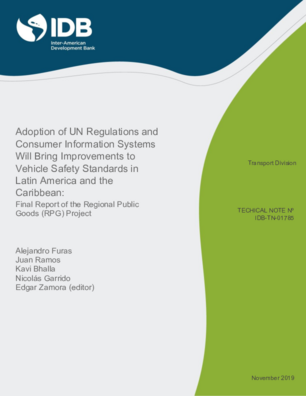Adoption of UN Regulations and Consumer Information Systems Will Bring Improvements to Vehicle Safety Standards in Latin America and the Caribbean: Final Report of the Regional Public Goods (RPG) Project

The Regional Public Good (RPG) "Support for the Implementation of Vehicle Regulation Standards in Latin America and the Caribbean", is a project that was born in response to the request of the countries of the region on the need to address the safety of vehicles as a key component of road safety, taking into account the low results in vehicle safety evaluations of passenger cars and the high fatality rates in the LAC region.
This study analyzes a list of seventeen (17) UN Regulations on vehicle safety and emissions that were selected by the beneficiary countries. The objective of the BPR is to analyze the regulatory frameworks of the interested countries, propose adjustments to them and provide tools and strategies to the governments of the region to attack the problem of vehicle regulation in terms of safety and emissions. The countries under study in this RPG were Argentina, Brazil, Colombia, Ecuador, Mexico, and Uruguay; however, the report is developed in such a way that its recommendations apply to the entire region. The RPG is made up of three multidisciplinary and interconnected fields.
The first part of the study, carried out by the New Vehicle Evaluation Program for Latin America and the Caribbean, develops an in-depth analysis of the existing local regulations in each of the six signatory countries of the RPG, generates a proposed text regulation for efficient application, analyzes how the homologation process should be and generates tools to support governments for said processes, all of which can be applied in the countries of the region. Technical and operational factors are taken into account for the efficient adoption of effective regulations, contributing to significant reductions in the number of fatalities and injuries due to accidents from the increase in road safety.
The second part of the study, developed by the University of Chicago, focuses on analyzing the potential impacts on health, based on the estimation of the number of lives that would be saved and the burden of disability avoided, as a consequence of the adoption of the safety regulations, as well as other aspects that can positively influence the improvement of safety.
Finally, the third part of the study prepared under the supervision of the Economic Commission for Latin America and the Caribbean (ECLAC) analyzes the economic impacts in terms of income and employment, trade and fiscal implications in LAC countries, as a result of the possible adoption of selected UN